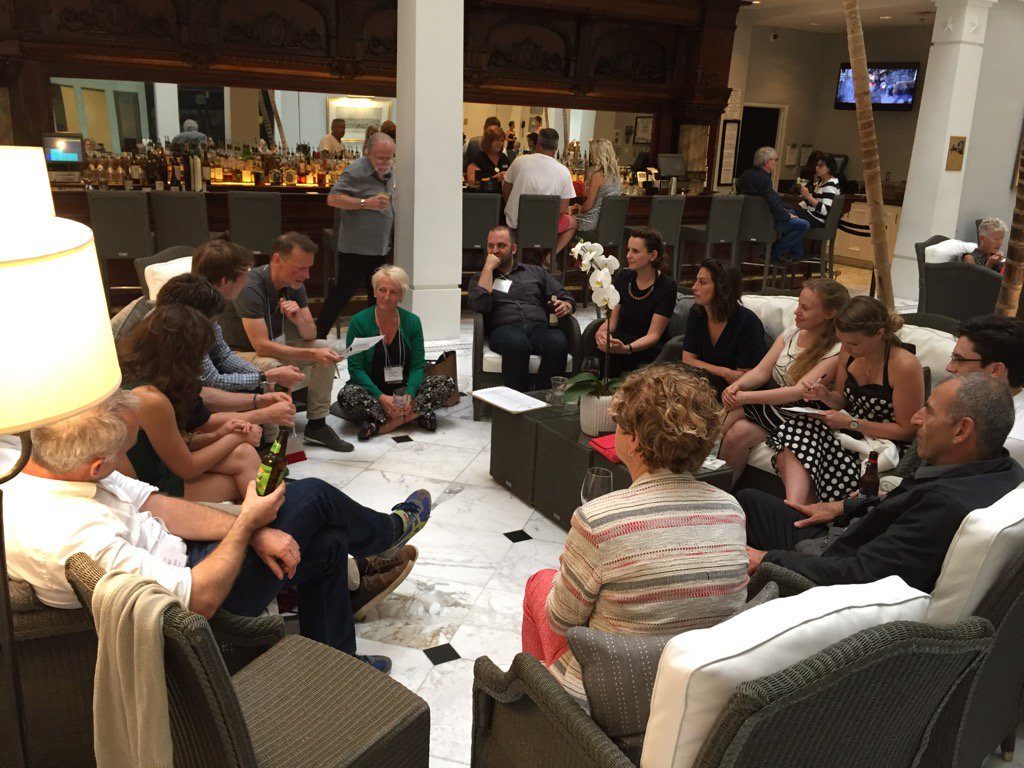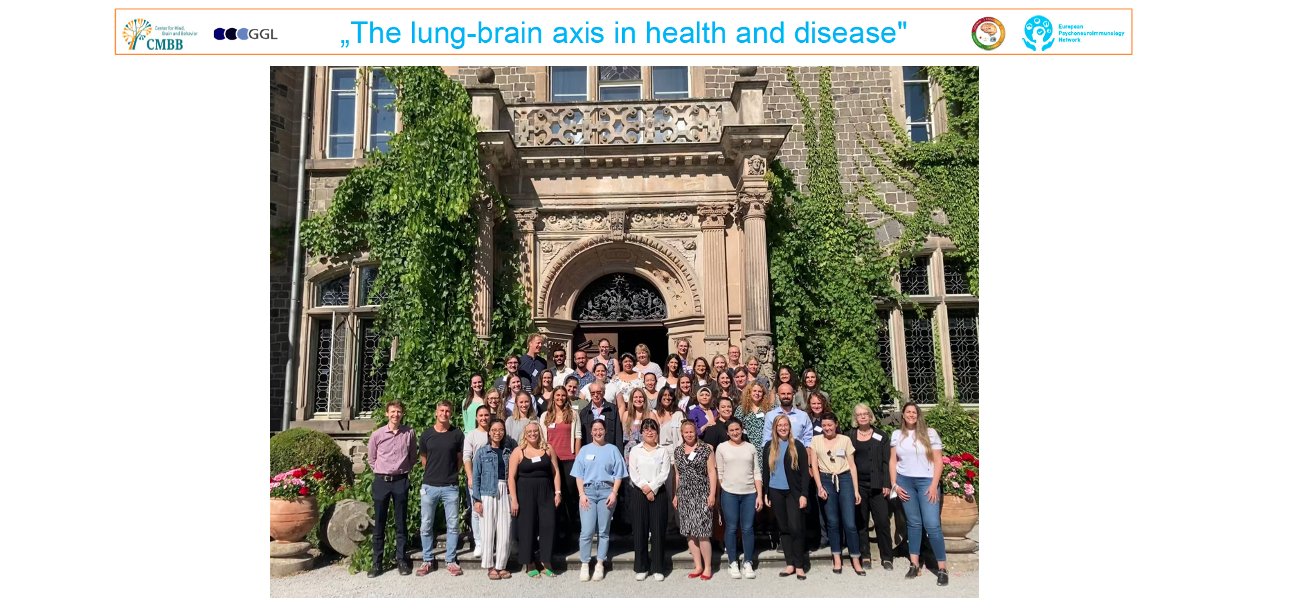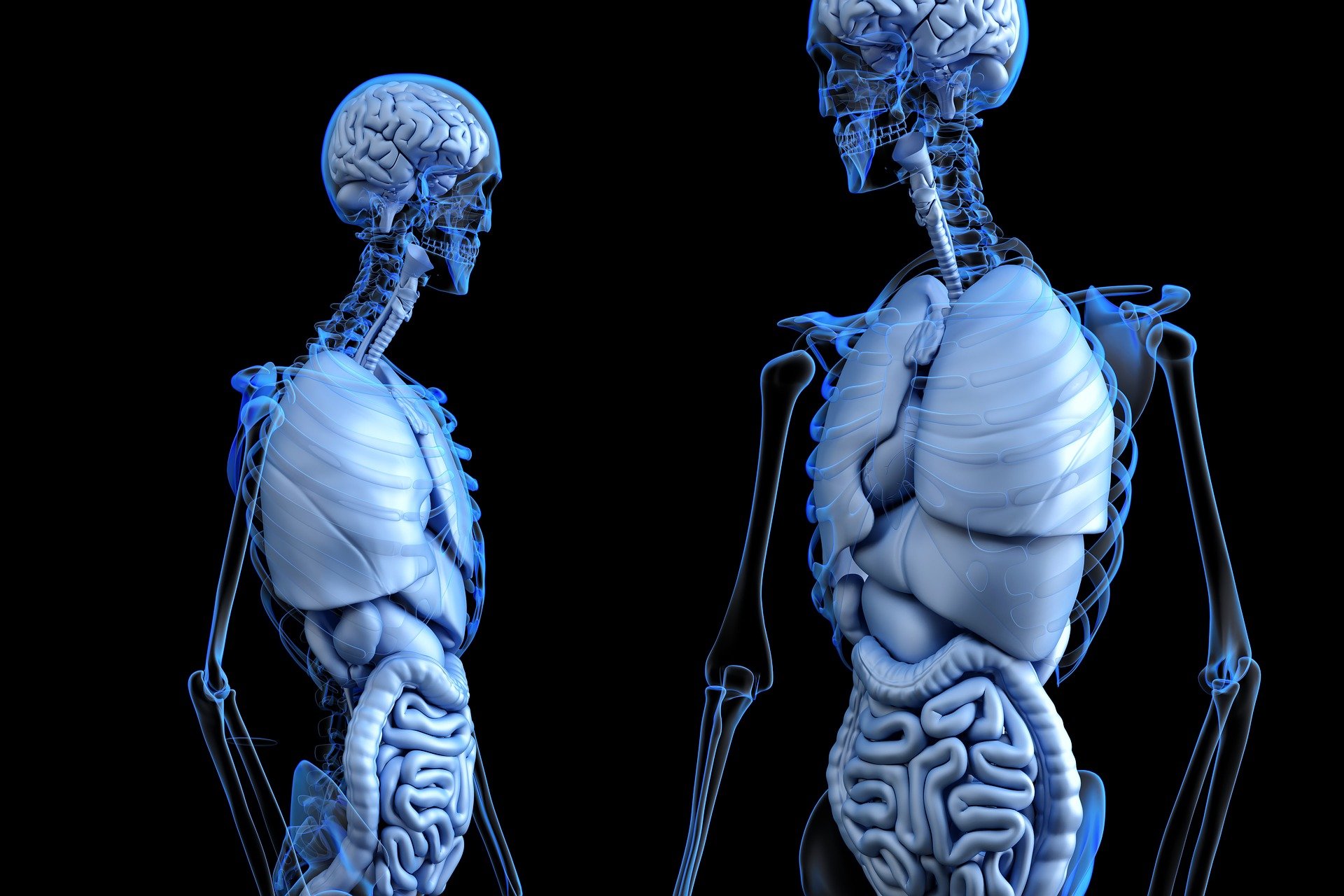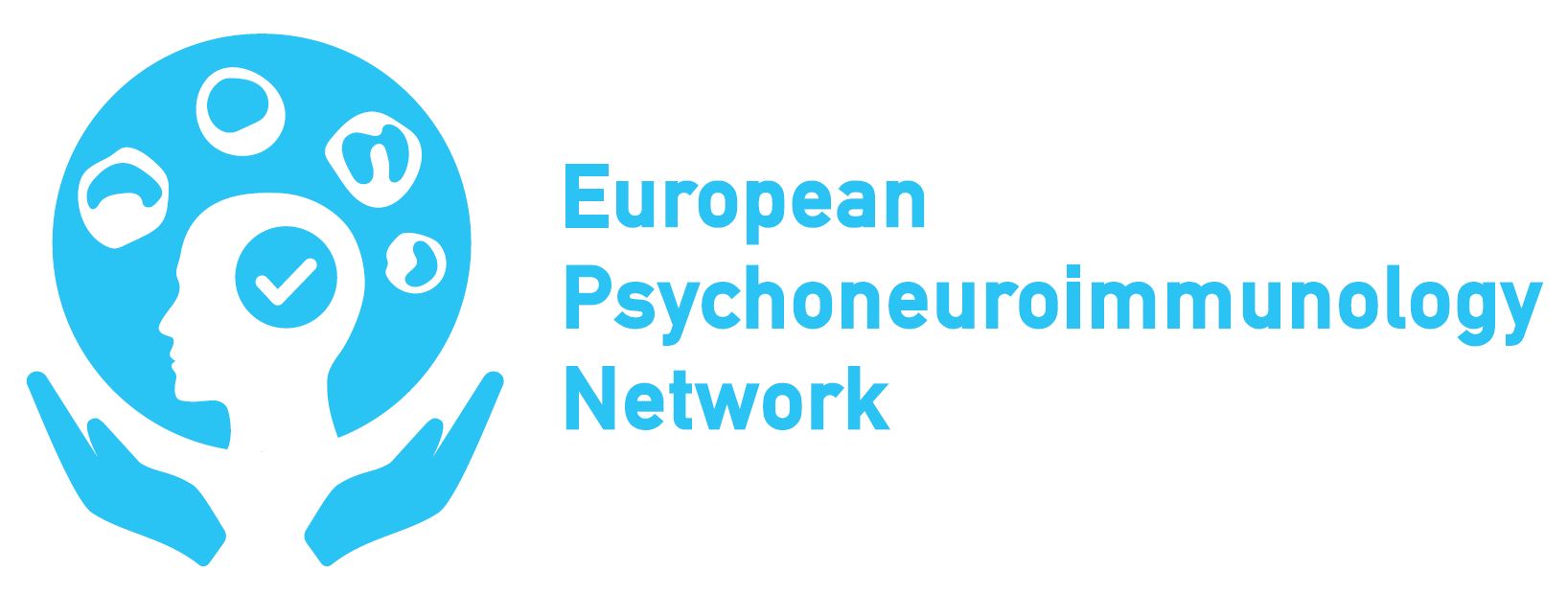!NEW! The EPN has organized its first own conference in October 2022, as well as the first Autumn school for trainees in Psychoneuroimmunology. The EPN also organizes webinar series on PNI topics to try and maintain interaction and exchange between EPN members. Please contact us if you would like to attend these seminar.
The EPN usually takes advantage of European and international conferences attended by the majority of its participants to meet once to twice a year. The EPN also aims at proposing PNI-themed symposia at these conferences.

European PNI Autumn school series – next Autumn school: September 2023
The European Psychoneuroimmunology (PNI) Autumn School Series, organized by the EPN and by the GEBIN, explores innovative ideas and research avenues in a multidisciplinary field that includes neuroscience, immunology, and mental health/stress research from basic to clinical science. Complex interdisciplinary interactions emerge as an important melting pot for the development of new integrative approaches addressing modern civilization health challenges. The Conference Venue Castle Rauischholzhausen is near Giessen and Marburg, Germany

EPN conferences
First EPN conference (hybrid) – October 2022, Karolinska Institutet, Stockholm, Sweden
Recent insights in Immunopsychiatry: towards treatment for immune-associated psychiatric disorders
Speakers: Golam Khandaker (University of Bristol, UK), Lilly Schwieler (Karolinska Institutet, Sweden), Christoph Rummel (Justus Liebig University Giessen, Germany), Bob Harris (Karolinska Institutet, Sweden)
Methods to study immune-brain communication
Speakers: Julie Lasselin (Karolinska Institutet and Stockholm University, Sweden), Simon Cervenka (Karolinska Institutet and Uppsala University, Sweden), Jan Pieter Konsman (CNRS and University of Bordeaux, France), Peder Olofsson (Karolinska Institutet, Sweden)
Disentangling the role of the immune system in chronic pain
Speakers: Camilla Svensson (Karolinska Institutet, Sweden), Jon Lampa (Karolinska Institutet, Sweden)
Neuropsychological consequences of immune activation and potential underlying mechanisms
Speakers: Martin Lord (Uppsala University), Michael Benros (University of Copenhagen, Denmark), Leonie Balter (Karolinska Institutet and Stockholm University, Sweden), Janet Cunningham (Karolinska Institutet and Uppsala University, Sweden)
Round tables
Symposia proposed by the EPN at conferences
At the 41st European Winter Conference on Brain Research (EWCBR) – Les Diablerets, Switzerland, March 4-11 2023
Interdisciplinary model and transdiagnostic symptoms
Chair: Mats Lekander (Karolinska Institutet and Stockholm University, Sweden)
Speakers: Harald Engler (University Hospital Essen, Germany), Sigrid Elsenbruch (Bochum University, Germany), Mats Lekander (Karolinska Institutet and Stockholm University, Sweden), Eva Kosek (Karolinska Institutet, Sweden), Mariya Ivanovska (Medical University-Plovdiv, Bulgaria)
Fatigue on a spectrum: a common symptom domain across disorders?
Chair: Elin Lindsäter (Karolinska Institutet, Sweden)
Speakers: Anna-Karin Norlin (Linköping University, Sweden), Hege Randi Eriksen (University of Bergen, Norway), Henrik Borsting Jacobsen (University of Oslo, Norway), Silje Reme (University of Oslo, Norway), Hans Knoop (Amsterdam University, the Netherlands), Anna Andreasson (Stockholm University and Karolinska Institutet, Sweden)
Sleep, stress, and health
Chair: John Axelsson (Stockholm University and Karolinska Institutet, Sweden)
Speakers: Tanja Lange (University of Lübeck, Germany), Stephanie Dimitroff (University of Konstanz, Germany), John Axelsson (Stockholm University and Karolinska Institutet, Sweden), Leonie Balter (Stockholm University and Karolinska Institutet, Sweden), Sandra Tamm (Karolinska Institutet, Sweden), Siri Leknes (University of Olso, Norway), Simon Kyaga (Karolinska Institutet, Sweden)
A way with words in the name of neurosciences: of terms and tools used to explore the neuronal environment
Chair: Jérôme Badaut (CNRS, Pierre and Marie Curie University, France)
Speakers: Jérôme Badaut (CNRS, Pierre and Marie Curie University, France), Simon Cervenka (Karolinska Institutet, Sweden), Carole Escartin (CNRS, Paris-Saclay University, France), Lorenz Hirt (CHU Lausanne, Switzerland), Jan Pieter Konsman (CNRS and University of Bordeaux, France)
Inflammation and sickness behavior
Chair: Lina Hansson (Karolinska Institutet and Stockholm University, Sweden)
Speakers: Lina Hansson (Karolinska Institutet and Stockholm University, Sweden), Daniel Wilhelms (Linköping University, Sweden), Neil Harrison (Cardiff University, UK), Kristoffer Månsson (Karolinska Institutet, Sweden), Marta Zakrzewska (Karolinska Institutet, Sweden)
At the 40th European Winter Conference on Brain Research (EWCBR) – Villars-sur-Ollon, Switzerland, March 7-14 2020
Interdisciplinary perspectives on stress, threat and adversity 1: From experimental tools to translation
Chair: Sigrid Elsenbruch & Harald Engler (University Hospital Essen, Germany)
Speakers: Jan Pieter Konsman (CNRS UMR 5287, University of Bordeaux, France), Harald Engler (University Hospital Essen, Germany), Sigrid Elsenbruch (University Hospital Essen, Germany), Eva Kosek (Karolinska Institutet, Stockholm, Sweden)
Pain mechanisms and therapies: neuronal coding, plasticity and novel regulators
Chair: Annemieke Kavelaars (MD Anderson Cancer Center, Houston, USA) & Niels Eijkelkamp (University Medical Center Utrecht, Netherlands)
Speakers: Liam Browne (University College London, UK), Shafaq Sikandar (University College London, UK), Annemieke Kavelaars (MD Anderson Cancer Center, Houston, USA), Niels Eijkelkamp (University Medical Center Utrecht, Netherlands), Cobi J. Heijnen (MD Anderson Cancer Center, Houston, USA)
Interdisciplinary perspectives on stress, threat and adversity 2: Consequences, risks and treatment
Chair: Mats Lekander (Karolinska Institutet & Stockholm University, Sweden)
Speakers: Katja Fall (Örebro University, Sweden), Fang Fang (Karolinska Institutet, Stockholm, Sweden), Unnur Valdimarsdóttir (Iceland University, Iceland), Elin Lindsäter (Karolinska Institutet, Stockholm, Sweden), Henrik Børsting Jacobsen (Oslo University Hospital, Norway), Shireen Sindi (Karolinska Institutet, Stockholm, Sweden)
Immune-brain interactions in Mice and Men
Chair: Neil Harrison (Cardiff University, UK)
Speakers: Christoph Rummel (Justus-Liebig-Universität Gießen, Germany), Neil Harrison (Cardiff University, UK), Simon Cervenka (Karolinska Institutet, Stockholm, Sweden), Mats Lekander/Kristoffer Månsson (Karolinska Institutet & Stockholm University, Sweden), Giada De Palma (McMaster University, Hamilton, Canada)
Immune influences on behavior
Chair: Anna Andreasson (Karolinska Institutet & Stockholm University, Sweden)
Speakers: John Axelsson (Karolinska Institutet & Stockholm University, Sweden), Serguei Fetissov (University of Rouen, Rouen, France), Anna Andreasson (Karolinska Institutet & Stockholm University, Sweden), Martin Jonsjö (Karolinska Institutet, Stockholm, Sweden), Bianka Karshikoff (Karolinska Institutet, Stockholm, Sweden), Leonie Balter (Stockholm University, Sweden)
At the 39th European Winter Conference on Brain Research (EWCBR) – Les Arcs, France, March 17-23 2019

Motivational perspective of fatigue and sickness
Chair: Julie Lasselin (Stockholm University, Stockholm)
Speakers: Marieke van der Schaaf (Radboud University, Nijmegen), Julie Lasselin (Stockholm University, Stockholm), Leonie Balter (University of Amsterdam, Amsterdam), Tamara Lacourt (MD Anderson Cancer Center, Houston), John Axelsson (Stockholm University, Stockholm), Mats Lekander (Stockholm University, Stochkolm)
Top-down regulation of the immune system
Chair: Nicolas Rohleder (Friedrich-Alexander-University of Erlangen-Nürnberg, Erlangen)
Speakers: Rainer Straub (Universität Regensburg, Regensburg), Nicolas Rohleder (Friedrich-Alexander-University of Erlangen-Nürnberg, Erlangen), Manfred Schedlowski (University Hospital Essen, Essen), Asya Rolls (Technion – Israel Institute of Technology, Haifa)
Peripheral immunity in neurocognitive, mental and somatoform disorders
Chair: Marco Cosentino (Insubria University, Varese)
Speakers: Marco Cosentino (Insubria University, Varese), Franca Marino (Insubria University, Varese), Martin Jonsjö (Karolinska Institutet, Stockholm)
Role of the microbiome and nutrition in eating, mood and cognitive disorders
Chair: Christoph Rummel (Justus-Liebig-Universität Gießen, Gießen) and Sophie Layé (University of Bordeaux, Bordeaux)
Speakers: Anna Andreasson (Stockholm University, Stockholm), Serguei Fetissov (University of Rouen, Rouen), Christoph Rummel (Justus-Liebig-Universität Gießen, Gießen), Sophie Layé (University of Bordeaux, Bordeaux)
Immunological underpinnings of changes in nervous system structure and function
Chair: Jan-Pieter Konsman (University of Bordeaux, Bordeaux) and Mats Lekander (Stockholm University, Stockholm)
Speakers: Agnès Nadjar (University of Bordeaux, Bordeaux), Regien Schoemaker (University of Groningen, Groningen), Jan-Pieter Konsman (University of Bordeaux, Bordeaux), Neil Harrison (University of Sussex, Brighton), Paul Hamilton (University of Linköping, Linköping), Mechiel Korte (Utrecht University, Utrecht), Harald Engler (University Hospital Essen, Essen), Cobi Heijnen (MD Anderson Cancer Center, Houston)
Behavioral and neuro-inflammatory mechanisms contributing to pain
Chair: Annemieke Kavelaars (MD Anderson Cancer Center, Houston)
Speakers: Henrik Børsting Jacobsen (Oslo University Hospital, Oslo), Sigrid Elsenbruch (University Hospital Essen, Essen), Eva Kosek (Karolinska Institutet, Stockholm), Annemieke Kavelaars (MD Anderson Cancer Center, Houston)
At the 38th European Winter Conference on Brain Research (EWCBR) – Villars sur Ollon, Switzerland, January 27-February 3 2018
Recent insights into the central effects of the immune system
Chair: Julie Lasselin (Stockholm University, Stockholm)
Speakers: Neil Harrison (University of Sussex, Brighton), Jan-Pieter Konsman (University of Bordeaux, Bordeaux), Cobi Heijnen (MD Anderson Cancer Center, Houston), Annemieke Kavelaars (MD Anderson Cancer Center, Houston), Eva Kosek (Karolinska Institutet, Stockholm)
Dimensional perspectives on regulation of health-related behaviors
Chair: Mats Lekander (Stockholm University and Karolinska Institutet, Stockholm)
Speakers: Mats Lekander (Stockholm University, Stockholm), John Axelsson (Stockholm University and Karolinska Institutet, Stockholm), Moa Pontén (Karolinska Institutet, Stockholm), Karin Jensen (Karolinska Institutet, Stockholm), Isabel Ellerbrock (Karolinska Institutet, Stockholm)
Biopsychosocial modulation of health outcomes
Chair: John Axelsson (Stockholm University and Karolinska Institutet, Stockholm)
Speakers: Julie Lasselin (Stockholm University, Stockholm), Martin Jonsjö (Karolinska Institutet, Stockholm), Jeanette Tour (Karolinska Institutet, Stockholm), Kristoffer Månsson (Stockholm University, Stockholm), Shireen Sindi (Karolinska Institutet, Stockholm)
EPN webinar series
EPN webinar series on interoception – winter 2020
 Rationale: Interoception is today considered as the sense of the internal state of the body that is distinct from exteroception, the sensitivity to external stimulation, and proprioception, the sense of the position and movement of body parts. Hunger and satiety are bodily states that have long been considered to involve interoception and can now be explained in quite mechanistic detail. Pain as an unpleasant sensory and emotional experience and indicating potential tissue damage is another modality for which many detailed explanatory mechanisms have been put forward. Finally, the study of feelings related to emotions and that of cognition are now also putting forward explanations involving interception. Given that inflammation reflects an altered internal state of the body and that the study of the effects of inflammation on behavior, emotion, mood and cognition is one of the main interests of our community, we propose a series of webinars focusing on interception from different points of view.
Rationale: Interoception is today considered as the sense of the internal state of the body that is distinct from exteroception, the sensitivity to external stimulation, and proprioception, the sense of the position and movement of body parts. Hunger and satiety are bodily states that have long been considered to involve interoception and can now be explained in quite mechanistic detail. Pain as an unpleasant sensory and emotional experience and indicating potential tissue damage is another modality for which many detailed explanatory mechanisms have been put forward. Finally, the study of feelings related to emotions and that of cognition are now also putting forward explanations involving interception. Given that inflammation reflects an altered internal state of the body and that the study of the effects of inflammation on behavior, emotion, mood and cognition is one of the main interests of our community, we propose a series of webinars focusing on interception from different points of view.
Background: In the early 20th century, Charles Sherrington coined the term “interoceptive” to refer to the internal bodily surfaces, for example of the gastrointestinal tract, proposed that it is “adapted to chemical agencies” (Sherrington, The integrative action of the nervous system, 1906, p. 317). Bud Craig, in the early 21st century, made a plea, based on neuroanatomical observations, to expand the notion interoception to correspond to the sense of the physiological condition of the body that gives rise to feelings (Craig, Nat. Rev. Neurosci., 2002; 2009). This then allowed Antonio Damasio to incorporate interoception into his somatic marker hypothesis driving feelings and cognitive processes (Damasio and Carvalho, Nat. Rev. Neurosci., 2013). Finally, interoceptive input has been proposed to be subject to predictive processing and that errors in this processing play a role in mental disorders (Barrett and Simmons, Nat.Rev. Neurosci., 2015).
Barrett, L; F. and Simmons, W. K., Interoceptive predictions in the brain, Nat. Rev. Neurosci., 2015 Jul; 16(7):419-29. doi: 10.1038/nrn3950.
Craig, A. D., How do you feel? Interoception: the sense of the physiological condition of the body, Nat. Rev. Neurosci., 2002 Aug; 3(8):655-66. doi: 10.1038/nrn894.
Craig, A. D., How do you feel–now? The anterior insula and human awareness, Nat. Rev. Neurosci., 2009 Jan; 10(1):59-70. doi: 10.1038/nrn2555.
Damasio, A. and Carvalho, G. B., The nature of feelings: evolutionary and neurobiological origins, Nat. Rev. Neurosci., 2013 Feb; 14(2):143-52. doi: 10.1038/nrn3403.
Sherrington, C. S., The integrative action of the nervous system, 1906, New Haven, Yale University Press.
Program:
The program will start off on Dec 10, 2020 with a session attempting to give a broad overview of the role of interoception in sickness behavior after detection of bacterial fragments in animals, from their least complex forms to human beings. The second session on Jan 28, 2021will address the role of adipose molecules in signaling health and disease. The series will end with a session on Feb 11, 2021 covering interoception-related issues that may be relevant for clinical practice.
Dec 10, 2020: 3-5 PM CET (UTC+1)
A vague feeling inside, a putative phylogeny of interoception applied to microbial detection: Jan Pieter Konsman (CNRS Aquitaine Institute for Cognitive and Integrative Neuroscience, University of Bordeaux, France)
An interoceptive predictive coding perspective on sickness behavior: Julie Lasselin (Department of Clinical Neuroscience, Karolinska Institute, Stress Research Institute, Department of Psychology, Stockholm University, Sweden)
Jan 28, 2021: 3-5 PM CET (UTC+1)
IL-6 and leptin: humoral mediators that signal from the periphery to the brain: Christoph Rummel (Department of Veterinary Physiology and Biochemistry, Justus-Liebig-University Giessen, Germany)
Adiponectin: a message of health? Giamila Fantuzzi (Department of Kinesiology and Nutrition, University of Illinois at Chicago, USA)
Feb 11, 2021: 3-5 PM CET (UTC+1)
Anxiety and Fears in critically ill patients: Tarek Sharshar (Department of Neuro-Intensive Care Medicine, Sainte-Anne Hospital, Paris-Descartes University, Paris, France)
Inflamed depression: Effects of immune manipulation on mood, motivation and cognition: Neil Harrison (Cardiff University Brain Research Imaging Centre, Cardiff University, Cardiff, UK)
